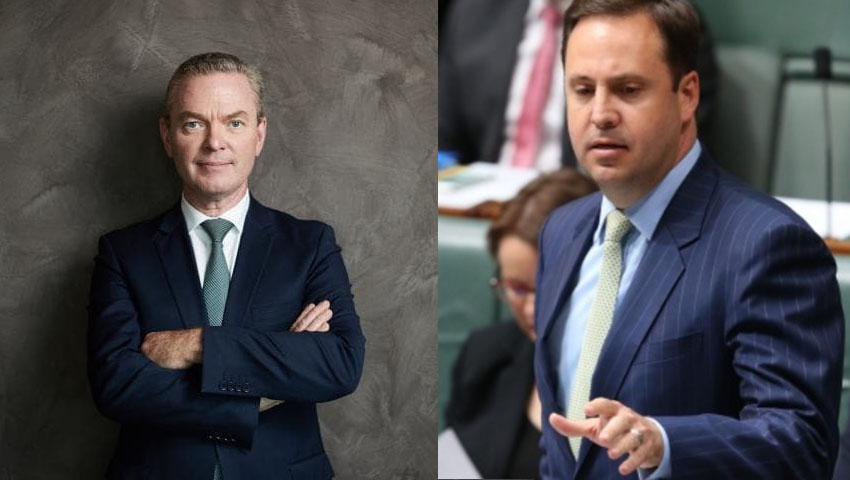While the retirements of Christopher Pyne and Steven Ciobo see the Defence portfolios vacated, the policies and industry blueprint put in place leave the industry primed to thrive regardless of future changes.
To continue reading the rest of this article, please log in.
Create free account to get unlimited news articles and more!
Amid the announcements from Defence Minister Christopher Pyne and now-former defence industry minister Steven Ciobo over the weekend, much of the public and media scrutiny has been focused on the mounting political challenges facing the Morrison government ahead of an expected May poll.
Both ministers have looked back at their time as stewards for Australia's defence policy and industry development, while Ciobo's successor, West Australian senator Linda Reynolds, has used the foundation established in the past three years to steady the ship and provide certainty moving forward.
Despite the churn of defence ministers dating back to the Howard era, Minister Pyne in particular made a major impact on the future direction, sustainability and competitiveness of Australia's emerging defence industrial base, ensuring that his successors, whether appointed by Prime Minister Scott Morrison or Opposition Leader Bill Shorten, will have a viable, robust and sustainable blueprint for developing Australia's future defence capabilities and defence industrial capability.
In the statement announcing his retirement, Minister Pyne remained proud of his achievements as both Defence and defence industry minister, saying, "As Minister for Defence and before that defence industry, I’ve been responsible for delivering the $200 billion build-up of Australia’s military capability, the largest in Australia’s peacetime history, which at the same time we have used to fundamentally reshape our strategic industrial base."
Minister Pyne's focus on implementing the 2016 Defence White Paper (DWP) and the complementary $90 billion Naval Shipbuilding Plan, 2016 Integrated Investment Plan and finally, the Defence Export Strategy and supporting organisations, has reshaped Australia's defence capabilities and defence industrial base for the first time since the end of the Second World War.
This relentless focus by Minister Pyne has sought to avoid the period of peaks and troughs, cost and delivery over runs in defence capability development and acquisition throughout the mid-2000s and into the 2010s in high-profile, troubled projects, including the Navy's Collins Class submarines, Hobart Class air warfare destroyers and the F-35 Joint Strike Fighter programs, which represent billions in investment in Australia's defence capabilities.
"These roles have included implementing the largest Navy, Air and Army projects in 75 years and creating the Pacific Step Up to support Australia’s strategic position in the south Pacific," Minister Pyne added.
While a relatively short tenure for Ciobo, he drew on his experience as minister for trade, tourism and investment to enhance and expand Australia's Defence Export Strategy through key allies throughout Asia and the broader world.
Ciobo reiterated the comments made by Minister Pyne regarding the government's unprecedented build up in the nation's defence industry, saying, "As minister for defence industry it has been a joy to work alongside the Hon Christopher Pyne MP, whose passion for all things defence is well known. Australia’s defence industry is in remarkably good shape and energised by the Liberal and National Parties' $200 billion build up of sovereign capability."
Building on these achievements, the appointment of senator Linda Reynolds to the role of Minister for Defence Industry to succeed Ciobo opens the door for generational change, drawing on the professional experience of Minister Reynolds to support the future development of Australia's defence industry.
"As a government, we must ensure they [Australian service personnel] are as safe and as best equipped as we can possibly make them. Ensuring the equipment we provide them is state of the art and, wherever possible, made right here in Australia," Minister Reynolds said following her swearing in over the weekend.
As a former senior-Army Reserves officer over several decades with a career in defence industry, Minister Reynolds identified her desire to continue the direction established by her predecessors and maintain a steady-ship for Australia's emerging defence industry, particularly during the period of mounting geo-political competition in our region.
"Having worked in and with our defence industry for many years, it is clear how capable we are here in Australia, and how smart we are. Our contemporary geo-strategic environment is challenging, and it is vital we deliver all new single service and joint capabilities, on time and on budget. Having delivered three large organisational reforms in Army, I understand the challenges inherent in doing so," Minister Reynolds added.
Despite these challenges, it is clear that the foundational work established as part of the 2016 Defence White Paper and supporting documents will provide a stabilising force for the incumbent defence portfolio ministers and their successors following the May election.
Stephen Kuper
Steve has an extensive career across government, defence industry and advocacy, having previously worked for cabinet ministers at both Federal and State levels.

 Login
Login








